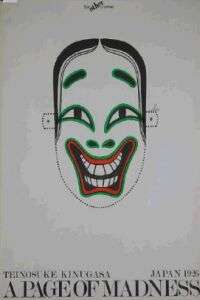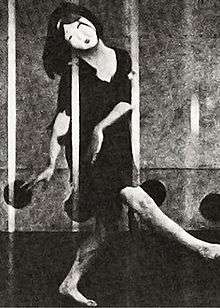A Page of Madness
A Page of Madness (Japanese: 狂った一頁, Hepburn: Kurutta Ippēji or Kurutta Ichipeiji) is a 1926 Japanese silent film directed by Teinosuke Kinugasa. Lost for forty-five years until being rediscovered by its director in his storehouse in 1971,[2][3]:42 the film is the product of an avant-garde group of artists in Japan known as the Shinkankakuha (or School of New Perceptions) who tried to overcome naturalistic representation.[3]:12[4][5]:59
| A Page of Madness | |
|---|---|
 Promotional release poster | |
| Japanese | 狂った一頁 |
| Hepburn | Kurutta Ichipeiji |
| Directed by | Teinosuke Kinugasa |
| Produced by | Teinosuke Kinugasa |
| Written by | |
| Starring |
|
| Cinematography | Kôhei Sugiyama |
Production company | Kinugasa Productions Shin Kankaku-ha Eiga Renmei Productions |
Release date |
|
Running time | 71 minutes[1] |
| Country | Japan |
Yasunari Kawabata, who would win the Nobel Prize for Literature in 1968, was credited on the film with the original story. He is often cited as the film's screenwriter, and a version of the scenario is printed in his complete works, but the scenario is now considered a collaboration between him, Kinugasa, Banko Sawada, and Minoru Inuzuka.[3]:26–33 Eiji Tsuburaya is credited as an assistant cameraman.
Plot

The film takes place in an asylum, in the countryside. Amid a torrential rainstorm, a janitor wanders through the halls revealing the various patients suffering from mental illness. The next day, a young woman arrives and is surprised to see her father, the janitor, working there. Her mother is an inmate in the asylum and had gone insane due to the cruelty of her husband, the janitor, when he was a sailor. The husband, feeling guilty, had taken a job at the asylum to care for her. The daughter announces that she is soon to marry a fine young man, but the janitor begins to worry, since society at the time still maintained the prejudiced view that mental illness was inherited. If the young man's family learns about the mother, the marriage might be called off.
At work, the janitor's relationship with his wife, unknown to the asylum, interferes with his job, as he gets into a fight with some male inmates when his wife is hit, and he is sternly scolded by the head doctor. All this sparks in the janitor to experience a number of fantasies, as he slowly loses control of his border between dreams and reality. He first has a daydream about winning a chest of drawers at a lottery that he could give to his daughter as part of her dowry. When his daughter comes to tell him her marriage is in trouble, he thinks about taking his wife away from the asylum to hide her existence. Finally, he fantasizes about killing the head doctor, but that reverie goes out of hand as a bearded inmate is seen marrying his daughter. The janitor finally dreams of distributing masks to the inmates, providing them at last with happy faces. He returns to work mopping the floors, no longer able to visit his wife's ward because he had lost the keys (picked up by the doctor). He sees the bearded inmate pass by, who bows to him for the first time, as if bowing to his father-in-law.
Cast
- Masao Inoue as the custodian
- Ayako Iijima as the custodian's daughter
- Yoshie Nakagawa as the custodian's wife
- Hiroshi Nemoto as the fiancé
- Misao Seki as the chief doctor
- Minoru Takase as patient A
- Eiko Minami as the dancer
- Kyosuke Takamatsu as patient B, the bearded inmate
- Tetsu Tsuboi as patient C
- Shintarō Takiguchi as the gateman's son
Release
Initial release
A Page of Madness was first screened in Tokyo on July 10, 1926.[3]:116 Screenings would have included live narration by a storyteller or benshi (弁士) as well as musical accompaniment. The famous benshi Musei Tokugawa narrated the film at the Musashinokan theater in Shinjuku in Tokyo.[3]:45
Contemporary screenings
The film was screened at the 2018 Ebertfest, on April 20.[6] It has also screened at the Lincoln Center in New York City featuring a live accompaniment with the Alloy Orchestra[1] and the Eastman Museum in Rochester, New York.[7]
Reception
Modern
Reception of the film since its rediscovery has been mostly positive. Dennis Schwartz from Ozus' World Movie Reviews awarded the film a grade A, calling it "a vibrant and unsettling work of great emotional power".[8] Time Out Magazine, praised the film, writing, "A Page of Madness remains one of the most radical and challenging Japanese movies ever seen here."[9] Panos Kotzathanasis from Asian Movie Pulse.com called it "a masterpiece", praising the film's acting, music, and imagery.[10] Jonathan Crow from Allmovie praised its "eerie, painted sets", lighting, and editing, calling it "a striking exploration of the nature of madness".[11] Nottingham Culture's BBC preview of the film called it, "a balletic musing on our subconscious nightmares, examining dream states in a way that is both beautiful and highly disturbing."[12] Jonathan Rosenbaum of The Chicago Reader praised the film's expressionist style, imagery, and depictions of madness as being "both startling and mesmerizing".[13]
It was later included at number 50 in Slant Magazine's "100 Best Horror Movies of All Time", citing the film's visuals and atmosphere as 'lingering long after the film ends'.[14]
See also
References
- https://www.filmlinc.org/films/a-page-of-madness/
- Sharp, Jasper (7 March 2002). "Midnight Eye feature: A Page of Madness". Midnight Eye. Retrieved 17 April 2007.
- Gerow, Aaron (2008). A Page of Madness: Cinema and Modernity in 1920s Japan. Center for Japanese Studies, University of Michigan. ISBN 978-1-929280-51-3.
- Gardner, William O. (Spring 2004). "New Perceptions: Kinugasa Teinosuke's Films and Japanese Modernism". Cinema Journal. 43 (3): 59–78. doi:10.1353/cj.2004.0017.
- Lewinsky, Mariann (1997). Eine Verrückte Seite: Stummfilm und filmische Avantgarde in Japan. Chronos. ISBN 3-905312-28-X.
- Galassi, Madeline (April 23, 2018). "Ebertfest 2018: Nine Things I Learned About A Page of Madness". RogerEbert.com. Roger Ebert Website. Retrieved 23 April 2020.
- https://www.eastman.org/page-madness
- Schwartz, Dennis. "kurutta". Sover.net. Dennis Schwartz. Retrieved 2 July 2018.
- "A Page of Madness, directed by Teinosuke Kinugasa". Time Out.com. TR. Retrieved 2 July 2018.
- Kotzathanasis, Panos (2018-05-19). "Film Review: A Page of Madness (1926) by Teinosuke Kinugasa By Panos Kotzathanasis". Asian Movie Pulse.com. Panos Kotzathanasis. Retrieved 2 July 2018.
- Crow, Johnathan. "A Page of Madness (1926) - Teinosuke Kinugasa". Allmovie.com. Johnathan Crow. Retrieved 2 July 2018.
- "BBC - Nottingham Culture - NOW Festival : A Page Of Madness". BBC.com. Nottingham Culture. Retrieved 2 July 2018.
- Rosenbaum, Johnathan. "A Page of Madness". ChicagoReader.com. Retrieved 23 April 2020.
- "The 100 Best Horror Movies of All Time". SlantMagazine.com. Slant Magazine. October 25, 2019. Retrieved March 22, 2020.
External links
- A Page of Madness at AllMovie
- A Page of Madness on IMDb
- A Page of Madness at Rotten Tomatoes
- A Page of Madness at the TCM Movie Database
- A Page of Madness at SilentEra
- A Page of Madness: The Lost, Avant Garde Masterpiece from Early Japanese Cinema (1926) in Film | January 17th, 2019
- Midnight Eye Entry